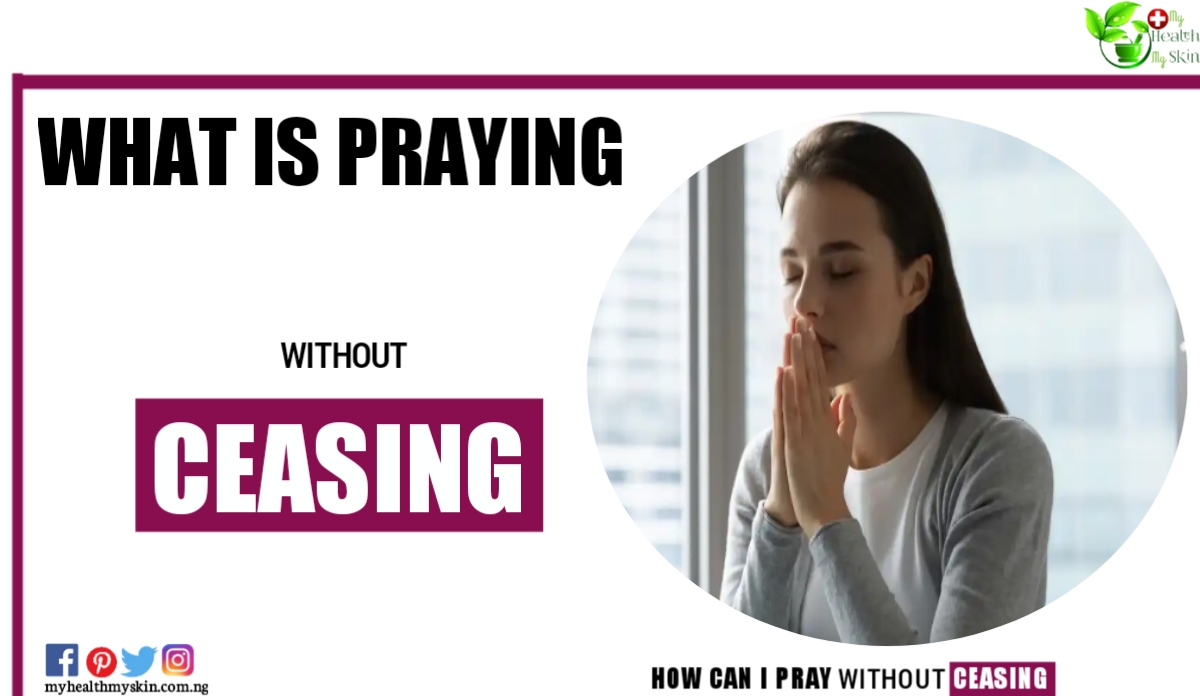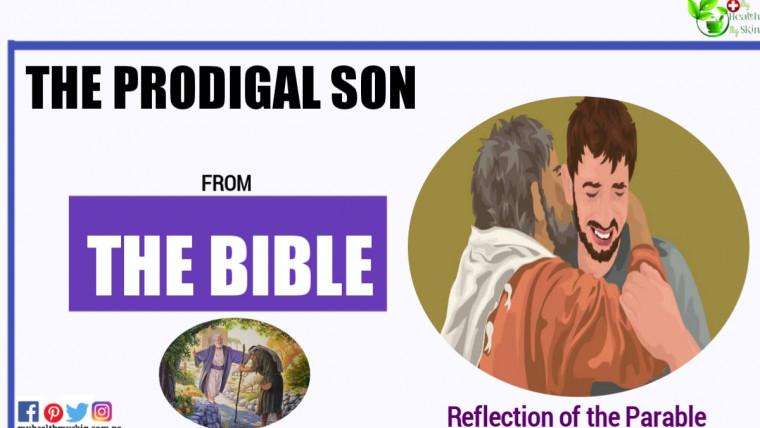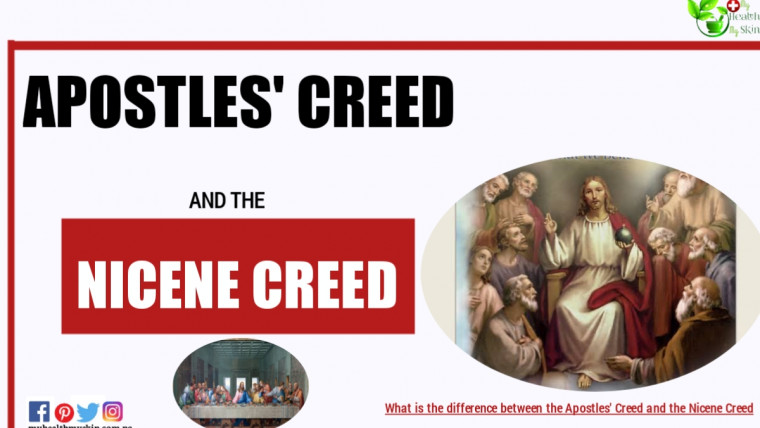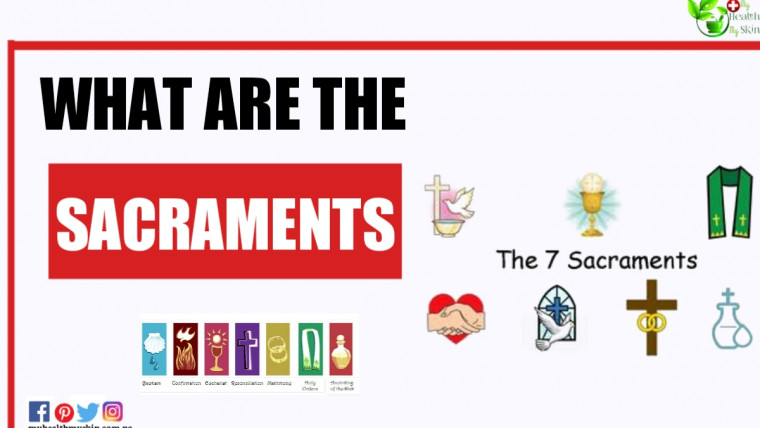Praying without ceasing is praying without rest, it is praying without losing consciousness, it is praying at all times.
To pray without ceasing is to be in communication with God at all times, to immerse ourselves in his presence, in his being, in his essence. For more Spiritual health information click here.
To pray without ceasing is to put everything at the feet of God and ask God to totally take over our lives.
Praying without ceasing is a very popular expression or heard in conversations about prayer, and perhaps you have asked yourself or have been asked, what does it mean to pray without ceasing? How can you pray without ceasing? To understand what it is to pray without ceasing or how you can pray without ceasing, it is important to define two themes or two words; first, which is to pray, which is prayer, and second, which is to pray without ceasing.
The reason why much is said about praying without ceasing is because the Bible is full of verses expressing that we have to pray, and even more in the book of 1 Thessalonians chapter 5 verse 17 it specifically tells us that we have to pray without ceasing.

1 Thessalonians 5: 15-17
Verse 15. “See that no one returns evil for evil, but always seek what is good for one another and for everyone”.
Verse 16. “Always be joyful. 17 Pray without ceasing”.
What is prayer?
To understand what it is to pray without ceasing and how to do it, let’s start by defining what prayer is. Prayer is a conversation with God.
Prayer is the way to communicate with God, it is creating a relationship with God, it is loving God and being loved by him.
Prayer is not one-sided, in other words, it is not one-way, prayer is two-way, we communicate with God, but God also communicates with us through prayer.
For this reason prayer is so important to our lives, because it allows us to be connected with God and create that relationship that we need and long for.
Many times we talk about wanting to create an intimate relationship with God, but when we reflect on our prayer life, we realize that we are not doing what is necessary to create and strengthen that relationship.
If I wanted to create a relationship with a person, I try to communicate with the person, I call them, we talk, I can write to them, I listen to them, I try to always be in communication with the person.
To create that relationship I need to communicate with the person to know more about the person and for the person to know more about me. It is very difficult to meet a person or create a relationship with a person to whom we do not speak, do not see, do not share.
The same happens with our relationship with God, we want to form a relationship with God, but we do not speak to him, we do not write to him, we do not seek him, we do not listen to him, we do not communicate with him.
For this reason it is so difficult for us to know God, to know what has been revealed to us and it is so difficult for us to create that relationship with him.
Prayer is precisely that method of communication with God, it is talking to God as we want to talk to someone with whom we want to form a relationship, someone we want to know and we want to know us.
Mention that the prayer was not one-sided, because, like any relationship, it must have two participants, so when we pray to God, we are talking with God, but at the same time listening to God.
When we talk or communicate with people, we usually have different topics of conversation, we talk about our problems, our sadness, our joys, our hopes, our goals, many things, for which the conversations have different topics and different purposes.
In the same way when we pray, when we communicate with God, we have different topics, different ways of talking to him, of expressing our concerns and of listening to him.
In general the church categorizes prayers into five main categories: Blessing, Petition, Intercession, Thanksgiving, and Praise. In a sentence we can have items from these five categories or we can focus on just one category.
In other words, When we talk to God we can be expressing one of the categories (such as intercession) or we can talk with God and talk about all five.
Prayer Categories

Blessing
The prayer of blessing is one in which we are worshiping God. We recognize his greatness and worship him as God.
Petition
The prayer of petition is when we talk to God and we make a specific request, we ask him or we beg him for any request that we have.
Intercession
Intercessory prayer is similar to petition, in that we are asking God for something specific, but the difference between petition and intercession (when we talk about prayer) is that in intercession we are asking for another person, we are imploring for the good of other.
Thanksgiving
The prayer of thanksgiving is the prayer in which we thank God for how much He has blessed us. It is a prayer of thanks.
Praise
The prayer of praise is by which we recognize the greatness of God, his power and all that he does for us and we express it to him in praise, in recognition or merit.
As you can see in a moment of prayer, when we are in communication with God, we can speak or reflect on any or all of these categories. The most significant aspect about prayer is that we pray.
Ways to pray
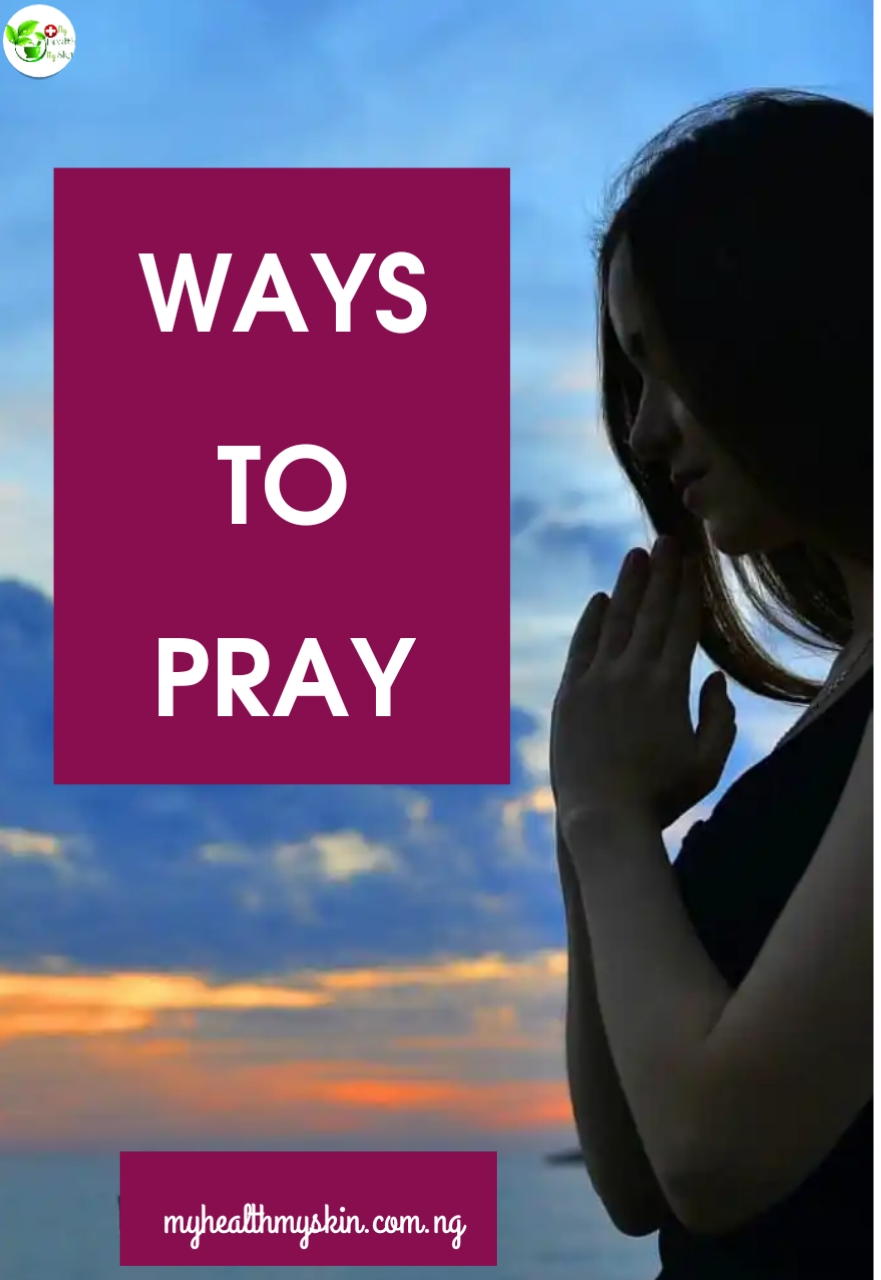
Aside from the categories of sentences, there are also three ways to pray: vocal, mental, and contemplative.
Vocal
Vocal prayer is the one we do out loud, which can be heard by the people around.
Mental
Mental prayer is what we do within ourselves, with our mind and it is usually more personal because it is individual, ours and others cannot hear it.
Contemplative
Contemplative prayer is the prayer in which we clear ourselves of everything, we let God speak to us and we hearken to him in the stillness of our study.
Types of Church Prayers
The church teaches us that there are many methods, forms and kinds of prayers, which we can adopt, and I would want to talk about some of the popular ones.
Lectio Divina
Lectio divina is prayer through reading the Bible. The word of God is the word of God and Jesus directly applied to our lives, for this reason one of the most effective ways to pray is through the word.
God talks to us directly through his word and for this purpose lectio divina is a very common form of prayer. Lectio divina Prayer contains four elements.
- Read the bible out loud
- Ponder / meditate on the passage that was read
- Pray to God for clearness and direction on the verse that was read
- Contemplate on what was read, heard, prayed and God’s response
Meditation of Saint Ignatius of Loyola
The meditation of Saint Ignatius of Loyola consists of reading a chapter from the Bible and upon it you contemplate. Meditation on that passage is also in the form of remembering the passage.
Through this meditation, you try to find yourself in the passage, to see what was seen in the passage, to listen to what was heard, to feel what they felt, and then reflect on what message God has for you through this passage.
For example, if you read the passage of the storm on the high seas with the disciples and Jesus sleeping, you imagine that you are one of the disciples and you are in the middle of the storm, what do you see, what you listen, what do you understand, what does it tell you about? God through that passage of the Bible?
Meditation of Saint Augustine
The Saint Augustine meditation is synonymous to that of Saint Ignatius of Loyola, in that you read a passage from the Bible and meditate upon the passage.
The difference is that, instead of moving to the time of the passage, in this meditation, you bring the passage into your life today.
For example, if we use the same chapter from the storm and the disciples, instead of recognizing that you are a disciple and are going through the storm with the other disciples, you use the chapter of the Bible in your present day life.
What storms are you going through today, what need do you have today, what does God want to tell you about that passage today?
Prayer of Psalms
The prayer of Psalms are prayers recorded in the bible. One of the known ways to pray is to pray with the psalms, you can take a different psalm every day and reflect on it, pray with it, ask God to help you and enlighten you through the psalm you read.
Eucharistic Adoration
Eucharistic adoration, also recognized as a holy hour is a time when you pray directly in front of Jesus in the Eucharist.
This is a very popular way of praying, because you find yourself in the presence of God Most High in a way that is different from the others.
During the holy hour or your Eucharistic adoration, you can pray mentally, vocally, contemplate, you can do a lectio, meditation on Saint Ignatius or Augustine, personal prayer with God or simply contemplate his greatness in stillness. Eucharistic adoration is a transforming prayer.
Holy Rosary
One of the best known prayers in the church is the holy Rosary.
The rosary prayer can be a vocal, mental, contemplative and meditative prayer. It all depends on how you want to conduct the rosary.
The rosary is a biblical prayer, in the sense that it uses passages from the Bible for meditation and contemplation.
The rosary itself is a prayer of entreaty or intercession, by which we implore Virgin Mary to intercede for us and our desires to God.
The meditation of the rosary is established on the mysteries of the life of Jesus Christ. We contemplate the moments of joy, sadness, glory and revelation of Jesus, his disciples and the mother of jesus (mary).
These are just some of the most popular or common prayer methods, but there are many more and none is better than another, they all have their form, their place and their method.
The important thing is that we pray, that we find a way to communicate with God, that we listen to him, that we strengthen that relationship.
When we pray, we know more about God and also about ourselves. Prayer helps us to be better people, to think more about others, to examine our lives and to understand God’s blueprint or plan for us.

What Is Praying Without Ceasing?
Praying without ceasing is praying without rest, it is praying without fainting, it is praying all the time.
To pray without ceasing is to be in communication with God at all times, to immerse ourselves in his presence, in his being, in his essence.
To pray without ceasing is to put everything at the feet of God and implore God to take over our lives completely.
But if praying without ceasing is praying at all times, how can we pray without ceasing, when we have jobs, school, families, activities that involve our time, treasures and talents.
If we pray at all times, when will we be able to elaborate the other activities? When can we foster the other relationships?
These are questions that you may have asked yourself or have been asked.
The reason for the question is because we think of the sentence in an external form. We think that to pray we need to be in a specific place, or to be with our eyes closed, or to be in a specific position (such as kneeling or prostrate).
But as we saw earlier, the sentence has many forms, it has many categories, and it has many methods.
The important thing is to pray. Praying is creating a relationship with God, it is communicating with God, it is talking with God.
As such, we can talk to God at all times, we can do it vocal / verbal, we can do it mentally or contemplatively. When we are working, we can dedicate our work to God, that is a way of praying.
Our activities, our commitments,our relationships can and should be ways of praying to God.
This is the way in which we can pray without ceasing, we can pray always, we can pray without fainting. Praying without ceasing also invites us or implies praying without losing hope.
Prayer makes us to understand how to be patient, to dawdle on God’s Will and not our will. When we pray without ceasing, we pray with faith that God will answer our prayers, that faith and hope should help us to continue praying, not to lose heart, not to abandon prayer.
We pray with faith that God will answer our prayers, that faith and hope should help us to continue praying, not to lose heart, not to abandon prayer.
Then;
How Can We Pray Without Ceasing?
We pray without ceasing when we give everything we have to God, when everything we do, we do for God, for God and through God. To pray without ceasing is to put God first and remember that everything we do can be a prayer to God.
Many times we make prayer much more complicated than it should be. Personal prayer must be personal, it must be different for each person.
Through this prayer we create that relationship with God, a relationship that is unique and specific. Since prayer is simply communicating with God, we can and should make it natural, the way we are.
The sentence doesn’t have to be complicated, it can be as simple as one word.
I heard of a story where a person in his Eucharistic adoration prayed to God and his complete prayer consisted of this person repeating; ABBA! ABBA! Which implies father.
This simple one-word prayer has great meaning and power for this person, because it helps him to recognize who his father is, that he is a son, as well as his dependence on God.
This is a simple example of what prayer is. Prayer is simply your connection with God. I repeat that the important thing in prayer is that you do it and that you do it from the heart.
There are people who tell me that they do not know how to pray personally and that they would like a guide on how to pray.
As I said before, personal prayer is personal, it does not have a good or bad formula. The necessary thing is to do it, but I found a formula that a brother named Matthew Kelly uses, which I think is a good formula for someone who is starting and does not find how begin the process of prayer. There are 7 steps in the guide to prayer:
1. Gratitude – start by thanking God for your last 24 hours.
2. Reflection – think about your last 24 hours, what you did well, what you did wrong, what you can improve, ask God for the strength to change and the knowledge to follow his directions.
3. Significant Moments – think of moments, people, thoughts or activities that were significant to you in the last 24 hours, ask God to reveal what He wants you to learn from them.
3. Peace – ponder on the events of sin in the last 24 hours: Who did you hurt? What and why did you commit the sins? Ask God for forgiveness and ask him to fill you with his peace.
4. Conversion – reflect on your last 24 hours, on the moments, situations, on your sins and ask God to show you how he wants you to change, to show you what conversion you should have.
5. Others – at this time put all the expectations of others at the feet of God, implore for all the needs of the world, your family, your community, your church, your loved ones and even more for the intentions that They have given you to ask for them.
6. Our Father – Our Father is for me, is one of the perfect prayers; how? Because Jesus himself taught it to us, Jesus gave it to us as an example, as a guide, as a formula to follow in prayer.
For this reason it is a perfect way to end your personal prayer.
As we have mentioned this is just an example or a guide on how you can develop your personal prayer. I repeat that the important thing is that you pray. Find a way to create a habit of prayer in your life. You can start with five minutes a day, then ten, then maybe twenty minutes and even more, through prayer you will find that your relationship with God will grow and God will help you continue on the journey called life.
As one of the perfect prayers for me is our Father, since Jesus himself taught it to us, I would like to conclude with the prayer. Remember how important it is to pray, do not be afraid, do not be intimidated, God is waiting for you.
Matthew 6: 9 -13
Verse 9. Therefore pray in this way: “Our Father who art in heaven”, “Hallowed be Your name”.
Verse 10. “Your kingdom come.
Thy will be done”, “on earth as it is in heaven”.
Verse 11. “Give us today our daily bread”.
Verse 12. “And forgive us our debts (offenses, sins), as we also have forgiven our debtors (those who offend us do us harm)”.
Verse 13. And do not lead us (do not let us fall) into temptation, but deliver us from evil (from the evil one). For Yours is the kingdom and the power and the glory forever. Amen.
Amen
